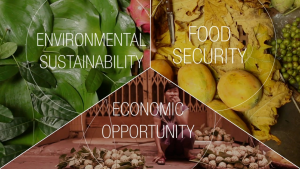THURSDAY, 24 MARCH 2016
[Interview by Lauren McGinney; BS: BlueSci, TB: Tim Benton]
BS: To begin with, would you label the current food security situation as a global ‘crisis’, that will become more of a noticeable or trackable problem in the future?

“We produce sufficient calories for over 11 billion people today, but a third are fed to livestock and about a third are lost and wasted”
BS: With global temperatures predicted to rise by 2 degrees by 2050, how can we tackle climate change whilst doubling food production in that timeframe, to ensure sufficient food resources for the 10 billion individuals predicted?
TB: We produce sufficient calories for over 11bn people today, but a third are fed to livestock and about a third are lost and wasted (and a few percent are inefficiently used by the 25-30% of the world’s population that are overweight or obese). So “doubling food production” to meet demand is a ‘business as usual assumption’. It needn’t be. Reducing waste and reducing demand (especially for grain-fed livestock) can ‘free up’ land, make space for biofuels production and for biomass carbon capture and storage (bCCS). But if everyone wants resource-intensive diets, cheaply, so food can be wasted without thought, then intensifying production makes climate change worse and it becomes a vicious circle.
BS: So are issues surrounding food production or food consumption the best approach to solving global food security issues? How can we tackle overconsumption and food waste, and its resultant impact on sustainability of food resources?
TB: Both. Social, environmental or economic change is needed. Somehow, food prices need to recognize the total cost of production. Increasingly, in environmental regulation, there is a ‘polluter pays’ principle. That is the essence of carbon-tax (and trading): GHG production is a form of (atmospheric) pollution and it is levying a long-term cost on everyone in the planet. Cleaning it up (or preventing it) needs to be a higher priority and so if food prices reflected the damage caused in production, people would, naturally buy less of the more-polluting things and more of the less-polluting things. The response to ‘true cost’ thinking is it will disadvantage the poor. For me, the solution is not simply to artificially keep all food prices down and therefore stimulate more long-term damage (which will amplify the costs on the poor) but to find ways of helping the poor afford more expensive food (e.g. living wages).
BS: On a related note, what are your views concerning the recent trend of high income, high consumption countries towards vegetarian and vegan diets – and the contribution, future potential and significant positive impact on food security issues?
TB: I’m not sure there has been much of a trend in society in general. Certainly, however, for many – especially younger people, eating meat more infrequently is becoming commoner. Indeed, such a change in diets has the potential to free up calories – or land – and thus reduce the problems of unsustainable global production by reducing food waste intensively produced [like] meat and dairy. Food security is, in essence, having access to safe and nutritious food for a healthy life. The issues vary around the world. In some parts of the world, people simply cannot afford, or cannot get access to, enough calories to survive. In others, calories are not an issue, but access to nutrients are. This may be seen in much of the developing world, where micro-nutrient deficiencies are rife. In the developed world, poverty is associated with diets heavy in calories (sugar and fat) but low in nutrients (‘healthy food’ is typically much more expensive than ‘unhealthy food’), so poverty, lack of nutrition, but obesity are signs of food insecurity in the developed world.
BS: How does an individual’s ‘Food Footprint’ – incorporating not only consumption and waste, but growth, production and supply considerations – vary across the world?
TB: Our food footprints are mainly influenced by our environments. A smallholder farmer in Africa may have a tiny ‘foodprint’, whereas someone in the developed world’s would be much larger. If I recall, from WWF’s living planet index, if everyone lived like an average ‘American’, we’d need four worlds to produce the food. But within our own environment, we can all reduce our footprints by changing the amount of food we waste and eating less intensively produced meat and dairy.
“Within our own environment, we can all reduce our footprints by changing the amount of food we waste and eating less intensively produced meat and dairy”
BS: In one of the most cited scientific papers of 2015, Gerardo Ceballos and co-authors claimed that we are driving the world into a sixth mass extinction. If true, how does this loss of biodiversity affect environmental sustainability and food security?
TB: Conversion of land to agriculture, and the intensification of agricultural land are the biggest threats to biodiversity globally (and historically). As GHGs from agri-food are more-or-less equivalent to all use of energy directly in the home (and domestic car use and air travel etc.), part of the biodiversity threat is via GHG emissions causing climate change and its impact on habitats. Again, for me, the answer is to change diets, reduce demand, and free-up space for nature. For more sustainable farming, to reduce GHGs and to capture carbon, by showing positively how people will be happier and healthier with a green lifestyle. We’d also be healthier…
BS: Is there a risk of nutritional crop quality declining as these issues are tackled?
TB: Nutritional quality has declined as we have selected on ‘yield’. Nutrient quality may well go down as CO2 rises in the atmosphere. Increasing reliance on fewer and fewer crops reduces dietary diversity and access to full range of nutrients…‘Business as usual’ may therefore reduce nutrition.
BS: How effectively are food fortifying initiatives such as the iodisation of salt resolving malnutrition problems, and how does this compare to biofortification methods?
TB: Why not grow more crops and eat a wider diet and waste less?
BS: How important is crop resilience to improving food productivity, and what research is currently underway in this area?
TB: Huge. Lots, but it doesn’t need to be all biotech… industrialization reduces resilience: that may be an issue as the climate changes. Better soil carbon, mulching, choice of crops, diversity of crops grown, water storage/irrigation etc. all play a role too…
BS: Developing this, what current scientific research, technologies and innovations have the greatest impact or significant potential to solve, or lessen, global food security issues? What contributions can the biotechnology, and related industries, claim?
TB: Understanding, mitigating and adapting to climate change I suspect! Understanding how to stimulate preference for a sustainable and nutritious diet would be my choice – so social innovation not just widgets and new genetics. Ultimately, we need a bit of everything on both production and consumption sides.
BS: What are your views on the growth and consumption of genetically modified crops in the UK?
TB: I think my feeling is that if people don’t want to eat certain things – whether they have evidence-based views or not – they shouldn’t be forced by corporate interests to do so. GM, or any technology, brings risks and they should be assessed. But if people don’t want it, even if it is safe, that should be respected. I don’t think the EU anti-GM stance is about risks, it is about power and who benefits. People often argue about risks when they really are arguing about power… Who is ‘we’ when we ask: Are we emphasizing the risks to too great an extent?
BS: Very recently, CRISPR Cas9 and related biochemical systems have promised methods to permanently alter crop yield, nutrition and pest control; how significant is the potential of these genome editing technologies, and how close are we to utilising their benefits?
TB: New technologies have significant potential. However, especially gene drives for pest control have significant risks (for diverse entomological ecosystems…). I guess part of my worry is we can develop new technologies that help supply and meet demand, but that won’t solve the issues of food insecurity – they are more systemic.
BS: To summarise, how optimistic are you when considering food security in the UK, as well as the global outlook in the predictable future?
TB: If we can break out of business as usual and work out how to incentivise healthy, sustainable eating, I am very optimistic.
Further reading:
Roundup ready: food security from 2015 into 2016 (Global Food Security, 2016)
Feeding the future: where does GM fit in? (Produce Business UK, 2016)
Our thanks go to Prof. Benton for this opportunity.

